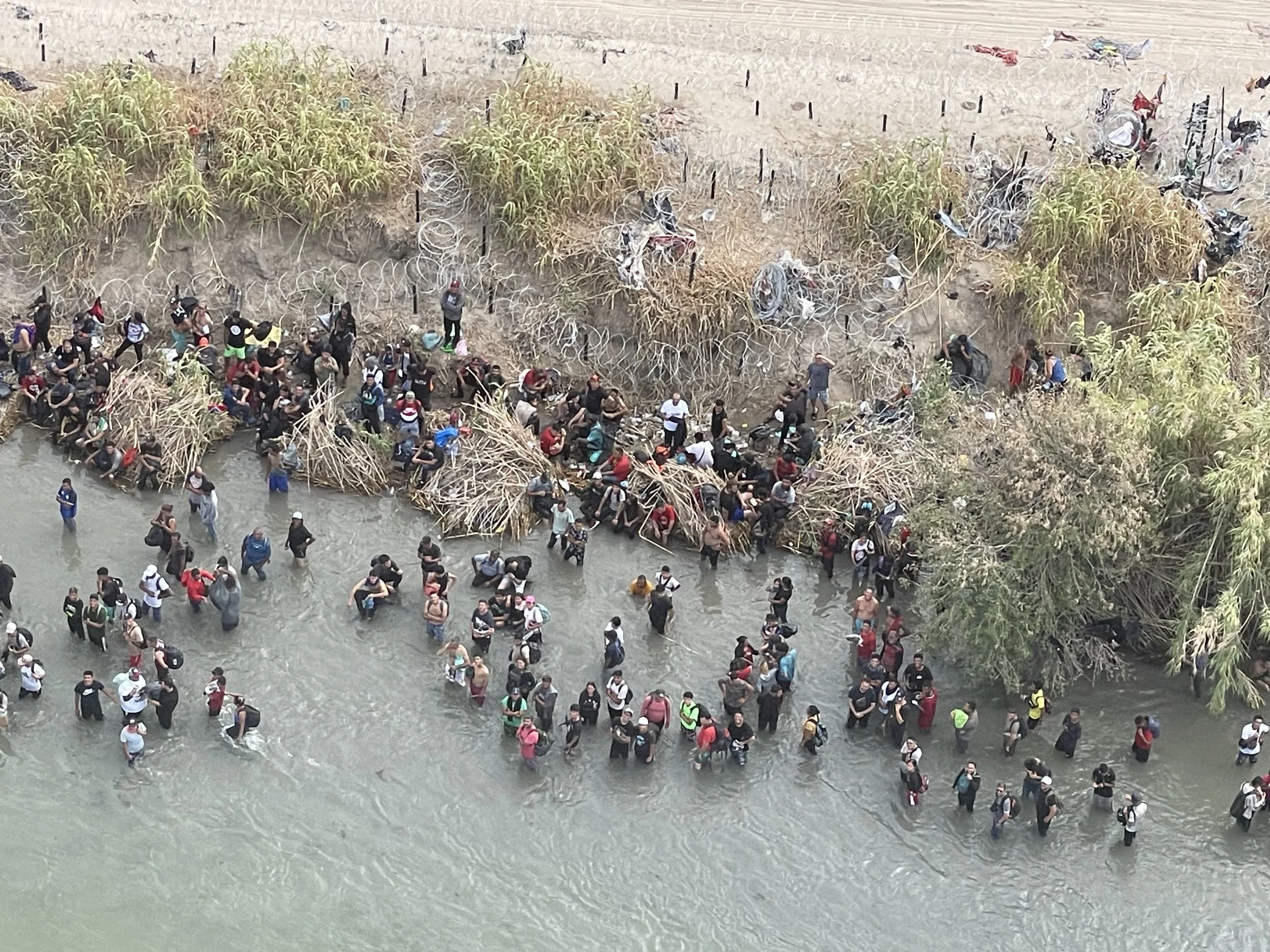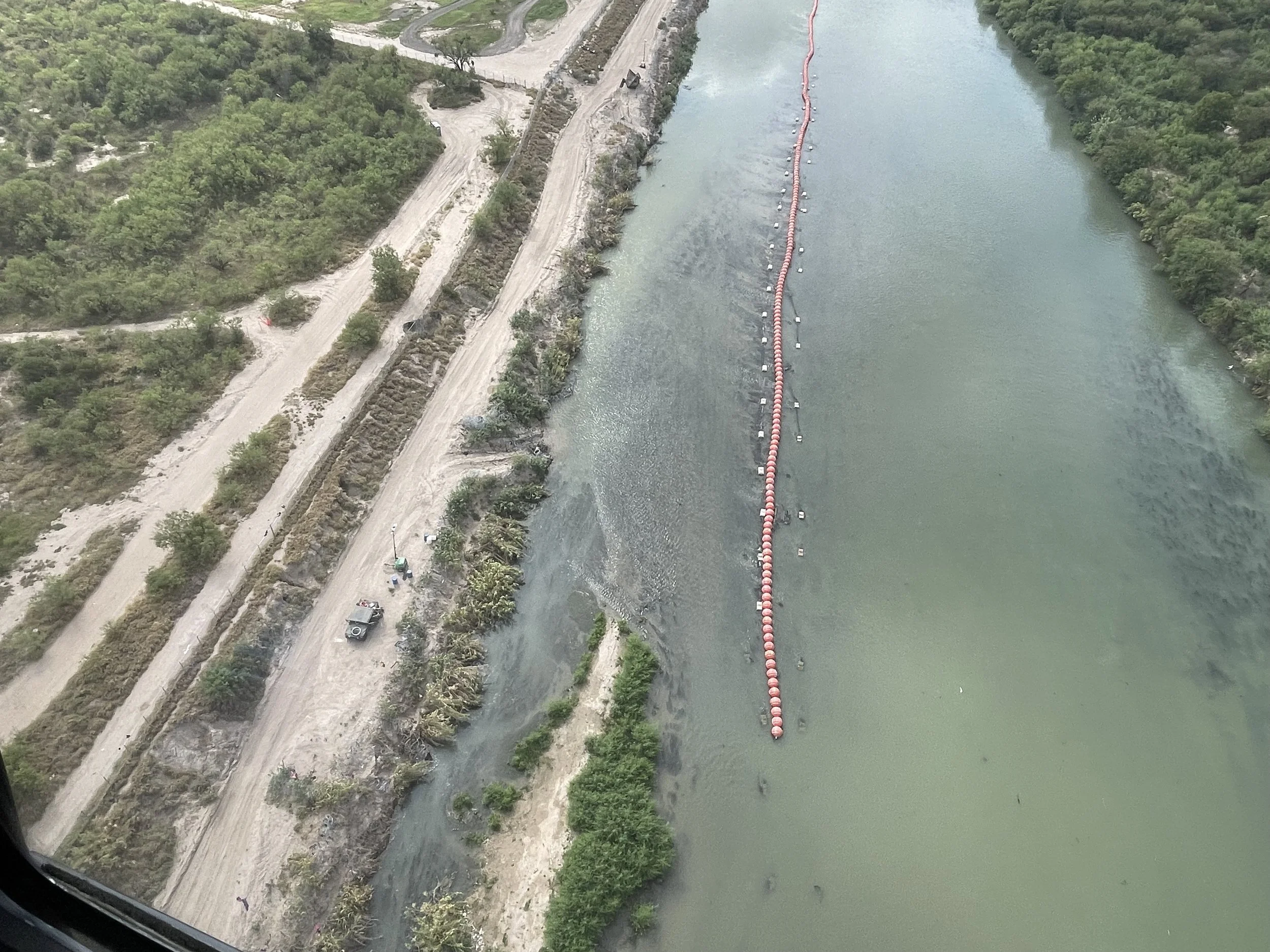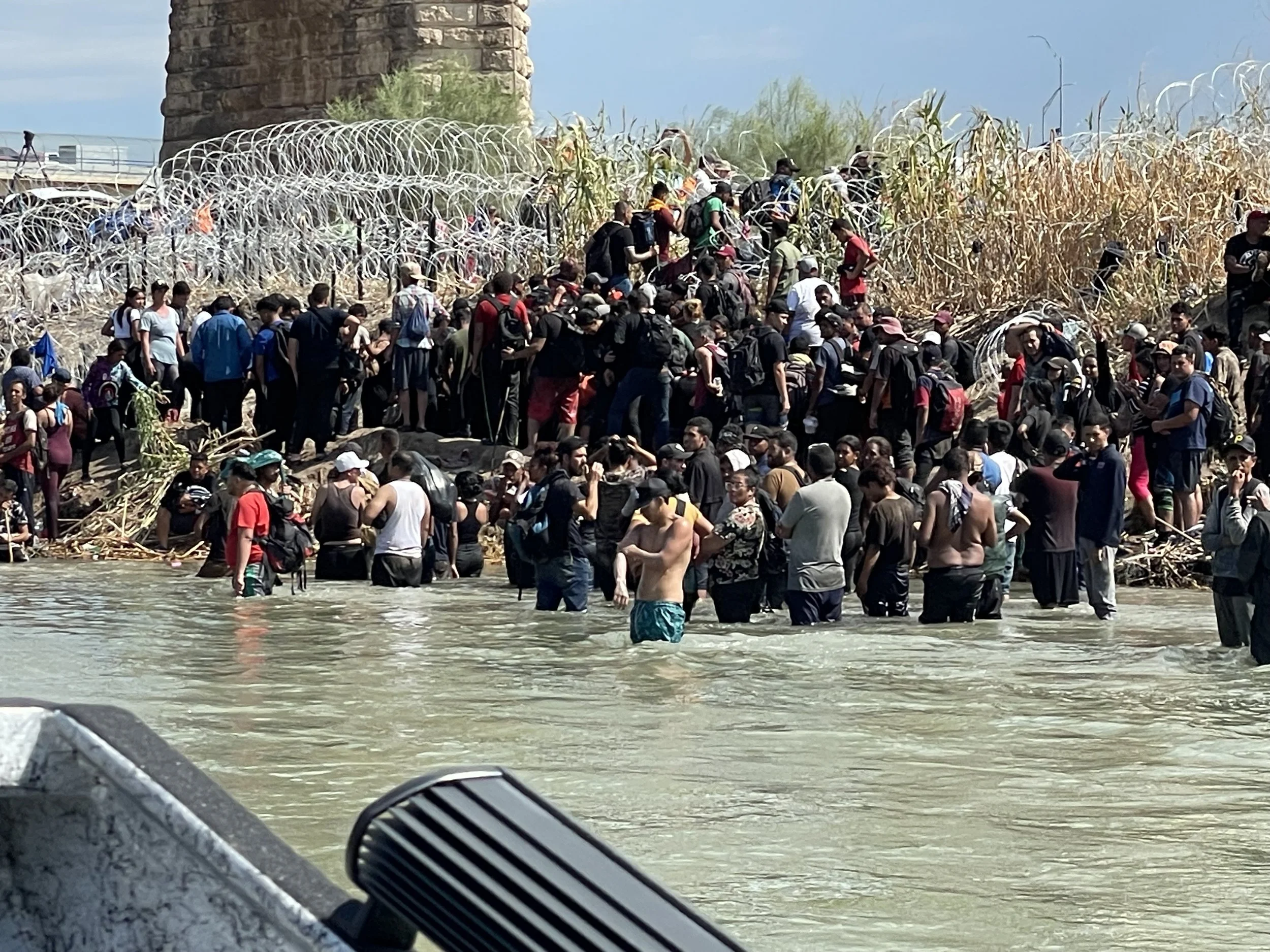Taken from Colonel Wilson’s helicopter overview of the Rio Grande 7/23/2023
In September of 2023, I had the opportunity to visit Eagle Pass, Texas, ground zero for the crisis on our southern border. I was accompanied by Texas Border Czar Mike Banks, Department of Public Safety (DPS) troopers, the Texas Military Department (TMD), and Chairman Ryan Guillen of the House Committee on Homeland Security and Public Safety.
This was just the latest of many trips to the border since the Biden administration assumed office, and the first time I attended with a delegation, rather than my usual unannounced visits. As Chairman of the House Committee on Defense & Veterans’ Affairs, it is my duty to witness firsthand the challenges that the men and women of our state face to help secure the Texas border as part of Operation Lone Star (OLS).
I have dedicated my life to ensuring the safety and security of Texans. In my 32 years of military service, with numerous deployments in Afghanistan and Iraq, I have worked firsthand fighting insurgency across the most dangerous borders in the world; including the Afghan/Pakistan and Iranian borders. As your Representative for House District 20, I have brought that experience to the border legislation I helped author, and to the advice and guidance I have provided to our executive agencies in charge of enacting those laws.
Not only is this issue of great importance to me as a veteran, a legislator, and a 6th generation Texan, it is important to me as a father. Our family is a family of service, and I am the proud father of a National Guardsman who has navigated balancing his college education with his deployments to help protect our Southern border.
I say all this so that you know these words do not come cheaply, they come from a man experienced in dealing with dangerous borders, and a family with our own lives on the line.
What is the crisis at the border?
The crisis at our southern border is one of dereliction of duty. Eleven years ago, the United States Supreme Court decreed in US v Arizona that only the US Federal Government had the ability to enforce immigration law. The Biden Administration has interpreted this decision to mean that a president can ignore immigration laws already passed by Congress, and simply choose not to enforce the parts of the law that the president does not like.
Operation Lone Star (OLS) is Governor Abbott’s initial response to the Biden Administration’s refusal to secure our border. Over the last two years, thousands of DPS Troopers alongside National and State Guardsmen have been deployed to the southern border. Since US v Arizona prevents direct immigration enforcement by the state, the OLS mission has been focused on building barriers and installing razor-wire to prevent illegal entry, and working with landowners near the border to enforce criminal trespass laws and other state laws that are often broken as a part of the process of entering the country illegally.
Under the orders of President Biden, Federal Customs and Border Protection (CBP) agents are neglecting enforcement of immigration law by instituting a “catch-and-release” policy. I witnessed firsthand how CBP agents responded to migrants crossing the Rio Grande. As the migrants came up to the razor wire installed as part of the OLS mission, CBP agents proceeded to cut the wire to allow the person or group to cross the border where they were then taken into custody for processing, and later released without penalty.
Knowing that there is no real penalty or immediate chance of deportation, roughly 6,000 people have illegally crossed the Texas/Mexico border every day since the start of the Biden Administration, accounting for 3/4 of all illegal border crossings. To put that number into perspective, at the end of last year the Texas Department of Criminal Justice (TDCJ) had the capacity to incarcerate 122,132 people. At the current rate of illegal immigration, arresting, processing, and holding every person crossing the border illegally would require the current resources of our entire criminal justice system every twenty-two days.
Cartels use the chaos as a cover for their drug smuggling and human trafficking operations. Even though many of those looking to come to the United States are not involved with drugs or trafficking, the cartels rely on unenforced laws, weakened infrastructure, and overwhelmed personnel. They can operate almost undetected, without real fear of having their activities curtailed by Texas or U.S. law enforcement.
Why is this happening?
To effectively solve any issue, it is crucial to identify and confront its fundamental cause when possible. In the context of immigration, the central question should be: “What compels such a large number of individuals to leave their homelands and migrate here?”
The recent increase in unauthorized immigration chiefly originates from various South American nations, with Mexico acting as a transit hub for those journeying to the United States. As of September, a sizable proportion, amounting to 55% of all interactions with border patrol, involved individuals from Venezuela, Guatemala, Honduras, Columbia, and Ecuador.
Over the past fifty years, there has been a consistent deterioration in the economic and political stability of these countries, reaching a critical point in the last decade. As economic instability intensifies, an increasing number of people are compelled to leave their home countries in search of better opportunities.
Venezuela is a prime illustration of this phenomenon. For generations, the country has been under the control of authoritarian regimes dominated by cartels, leading to a severely deteriorated economy. A Venezuelan is five times more likely to seek illegal entry into the U.S. compared to a Mexican. In September 2023, Venezuelans represented 18% of all encounters with U.S. Customs and Border Protection.
The situation in Venezuela is not hopeless. Recently, the Venezuelan people elected a new president committed to combatting cartel corruption and steering the nation towards free enterprise and economic rejuvenation. Although this transformation will require time, any positive changes in Central and South America are likely to alleviate the challenges faced by Texas.
What Can Texas Do?
Regrettably, Texas has limited capacity to tackle the underlying issues, as matters of international affairs are beyond our control. Nevertheless, there is significant scope for addressing the immediate consequences and compensating for the Biden Administration’s lack of enforcement of federal immigration laws. This necessitates a transition from reliance on emergency, temporary measures to the development and implementation of sustainable, long-term solutions.
In the 4th Special Session of the 88th Legislature, we passed two major pieces of legislation addressing these issues directly.
Line of Buoy Barriers in the Rio Grande, taken from Colonel Wilson’s helicopter overview of the border 7/23/2023
Improving Border Infrastructure
The state legislature has allocated $6.6 billion to support Operation Lone Star and enhance border security infrastructure. This funding is directed towards specific initiatives, including the construction of border barriers, the deployment of buoys, and providing financial support to the Department of Public Safety (DPS) and local law enforcement agencies.
Given that constructing walls directly within the Rio Grande River is unfeasible, individuals reaching the wall inevitably step onto American soil, thereby enabling U.S. Customs and Border Protection (CBP) to intercept and process them. Although this approach has limited efficacy in deterring economic migrants – as they are often released by CBP post-processing without deportation – it proves significantly effective against those involved in other illicit activities. Individuals engaged in terrorism, drug smuggling, or human trafficking typically aim to evade arrest, and thus, are more likely to be deterred by the presence of the wall.
Constructing a comprehensive border wall is a time-intensive endeavor, yet Texas is committed to ensuring that it is done correctly from the outset. With an existing stretch of 319.9 miles of wall – comprising 179.9 miles formed by natural barriers such as mountains, 65.7 miles erected during the Trump Administration, and 74.3 miles constructed under President Bush’s tenure – Texas aims to construct an additional 825.8 miles of robust border wall to fully secure its borders.
The barriers constructed by the Texas Facilities Commission (TFC) are more than just walls, encompassing not only physical structures but also incorporating essential electrical and communications infrastructure. This integration is crucial for adequate lighting and surveillance of the border, facilitating comprehensive security. Current projections, based on an annual budget of $750,000,000, anticipate the construction of approximately 65 miles of wall each year. Consequently, the completion of the border wall is projected to be a long-term endeavor, spanning 10 to 15 years.
The current allocated funds for border infrastructure provide a solid foundation. However, in the forthcoming 89th Legislative Session in 2025, I intend to advocate for the allocation of additional surplus funds as needed. This effort aims to accelerate the project, shortening the timeline for completion as much as feasibly possible.
Moreover, the construction of walls will be complemented by the strategic placement of buoys. These buoys are designed to deter illegal entry into U.S. territory, thereby encouraging individuals to use legal ports of entry. The deployment of buoys depends on specific environmental factors, such as suitable water depth and favorable weather conditions, limiting their use as the primary means of deterrence.
Making illegal entry a felony
In the 4th special session, we imposed strict penalties for illegal entry into Texas, starting as a Class B misdemeanor and escalating to a felony for repeat violations. It further criminalizes reentry by previously removed aliens, with penalties varying by criminal history and reasons for removal.
Central to the act is the power given to magistrates and judges to order non-U.S. citizens to return to their home countries, targeting individuals without serious convictions or current charges for major offenses. It also requires collecting and cross-referencing biometric data with criminal and national security databases, highlighting a focus on public safety.
Crucially, the legislation grants immunity and indemnification to local and state officials, employees, and contractors enforcing these rules, except in cases of bad faith or recklessness, ensuring accountability and protection for enforcers.
Under this law, those charged or convicted are ineligible for community supervision or deferred adjudication, reflecting the seriousness of immigration offenses. Additionally, the law requires recording all related orders in the state’s criminal history system, improving offense tracking and management.
The act also restricts parole and mandatory supervision for inmates convicted of these offenses, emphasizing its stringent stance on immigration violations.
Group of illegal aliens attempting to cross the border, taken from Colonel Wilson’s boat overview of the Rio Grande 7/23/2023
Final Thoughts
Governor Abbott merits recognition for his proactive measures in fortifying our border at a time when the Biden Administration has not fulfilled its responsibilities to the State of Texas, and the United States. Governor Abbott’s call for more lasting solutions during the special legislative session is commendable, aimed at safeguarding our citizens and potentially diminishing the necessity for Operation Lone Star.
The primary mission of the National Guard is to remain prepared for national defense. It is standard practice for Texas Military Department (TMD) forces to be deployed globally in support of the Department of Defense.Maintaining military readiness necessitates that soldiers and airmen fulfill specific individual and collective training requirements on a quarterly, semi-annual, and annual basis.
In contrast to emergency response scenarios, where National Guard units might be deployed for a few weeks or months for events like hurricanes without impacting their training schedule, Operation Lone Star (OLS) has necessitated extended, year-long deployments. These prolonged commitments have significantly interfered with the National Guard’s capacity to conduct their training effectively.
To compliment the accelerated construction of the border wall, Texas ought to explore the creation of a specialized agency or a distinct division within the Department of Public Safety, dedicated exclusively to handling border-related criminal activities. Establishing such an entity is crucial for unifying and optimizing the state’s current border security initiatives. The primary function of this focused agency would be the investigation of an array of border-related crimes, encompassing human smuggling, drug trafficking, and money laundering.
Furthermore, this agency would have the crucial role of gathering and analyzing detailed data on border-related cases handled by various law enforcement agencies. Oversight responsibilities for this agency could be assigned to the Texas Department of Public Safety or, alternatively, might require the establishment of a new Texas Department of Homeland Security. Such an initiative would not only bolster border security but also generate new job opportunities for law enforcement professionals with expertise in this specific area.
The establishment of a permanent force would also allow existing OLS forces to return to their standard duties. DPS troopers could return to supporting our police and sheriffs' offices around the state to combat the general rise in crime and increasing incidents of retail theft and allow deployed National Guard to return to their homes and businesses.
It is impractical to depend indefinitely on the federal government to fulfill its responsibilities in this context. The transition to an administration that might be more aligned with our needs does not assure sustained action, and our security should not be contingent on the occupants of the White House.



